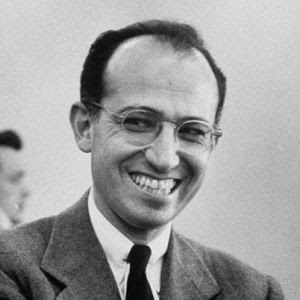Salk preferred not to have his career as a scientist affected by too much personal attention, as he had always tried to remain independent and private in his research and life, but this proved to be impossible. "Young man, a great tragedy has befallen you—you've lost your anonymity", the television personality Ed Murrow said to Salk.
The vaccine is calculated to be worth $7 billion had it been patented. However, lawyers from the National Foundation for Infantile Paralysis did look into the possibility of a patent, but ultimately determined that the vaccine was not a patentable invention because of prior art.
Dr. Jonas Salk gave a lengthy interview to Edward R. Murrow to explain how his polio vaccine would work.
In this clip of that interview - from "See it Now" - Murrow asks Salk:
Who owns the patent?
In an answer that may not be typical, Salk responds:
The people, I would say. There is no patent. Could you patent the sun?
Perhaps like Dr. Wilhelm Konrad Roentgen (1845-1923), who discovered X-Rays but refused to patent his invention, Dr. Salk may have believed that personal gain is secondary to helping mankind.
Dr. Robert Cook-Deegan - Director of the Center for Genome Ethics, Law and Policy at Duke University - makes the following observation about Dr. Salk's "patent the sun" comment:
When Jonas Salk asked rhetorically "Would you patent the sun?" during his famous television interview with Edward R. Murrow, he did not mention that the lawyers from the National Foundation for Infantile Paralysis had looked into patenting the Salk Vaccine and concluded that it could not be patented because of prior art - that it would not be considered a patentable invention by standards of the day.
Cook-Degan goes further, referencing Patenting the Sun, by Jane S. Smith (which is not-yet available for online reading at Google Books):
Salk implied that the decision was a moral one, but Jane Smith, in her history of the Salk Vaccine, Patenting the Sun, notes that whether or not Salk himself believed what he said to Murrow, the idea of patenting the vaccine had been directly analyzed and the decision was made not to apply for a patent mainly because it would not result in one.
Whatever the reason not to patent the Salk vaccine, its usefulness has been profound. Polio has been prevented internationally, as the World Health Organization reports:
- Polio (poliomyelitis) mainly affects children under five years of age.
- One in 200 infections leads to irreversible paralysis. Among those paralysed, 5% to 10% die when their breathing muscles become immobilized. [That was a reason for the "iron lung" which was used to help people breathe.]
- Polio cases have decreased by over 99% since 1988, from an estimated 350,000 cases then, to 650 reported cases in 2011. The reduction is the result of the global effort to eradicate the disease.
- In 2012, only three countries (Afghanistan, Nigeria and Pakistan) remain polio-endemic, down from more than 125 in 1988.

No comments:
Post a Comment